In Lubitsch's silent drama Carmen (Ernst Lubitsch, 1918) the gypsy vamp was of course played by Pola Negri. She does a great job. Her Don José was played by Harry Liedtke. The film was an international success.
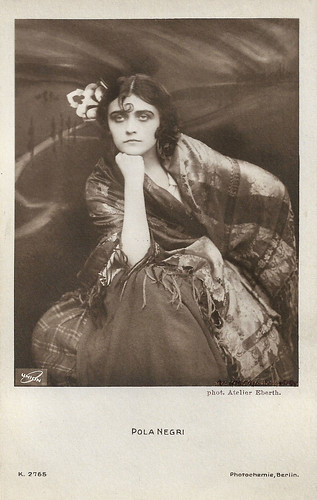
German postcard by Photochemie, Berlin, no. K. 2765. Photo: Atelier Eberth / Union. Pola Negri as Carmen in the German silent drama Carmen (Ernst Lubitsch, 1918).
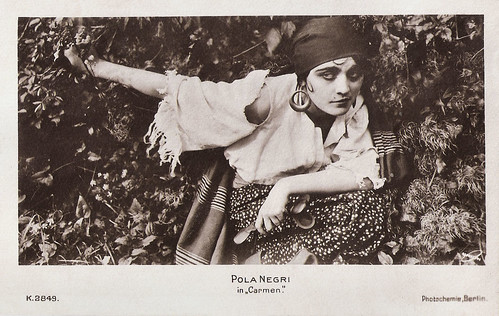
German postcard by Photochemie, Berlin, no. K. 2849. Photo: Union. Pola Negri as Carmen in Carmen (Ernst Lubitsch, 1918).
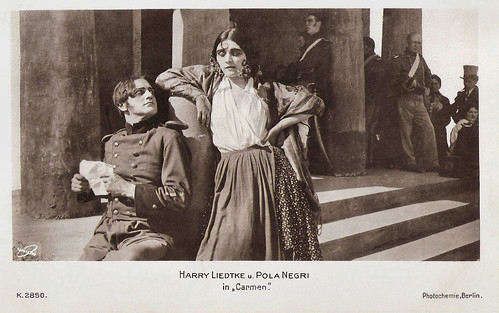
German postcard by Photochemie, Berlin, no. K. 2850. Photo: Union. Pola Negri as Carmen and Harry Liedtke as Don José in the German silent drama Carmen (Ernst Lubitsch, 1918).
Ernst Lubitsch’s career as a filmmaker blossomed just as the First World War was drawing to a close. In 1918, he went from being mostly a comedic director to a supposedly more serious filmmaker of pseudo-historical tragedies, with bigger budgets and a new star - Pola Negri, a fellow actor from the Deutsches Theater.
Lubitsch based his drama Carmen (1918) on the novella Carmen by Prosper Mérimée. Like George Bizet's opera Carmen, the film only adapts the third part of Mérimée's novella.
Lubitsch transformed the character of Don José (Harry Liedtke) at the beginning of the story from bandit on the run to honest man in love with his childhood sweetheart.
The story is told by a man at a camp-fire who says that it took place many years before. Don José was a Dragoon Sergeant in Sevilla who fell madly in love with Carmen (Pola Negri), a beautiful gypsy. For her, he killed an officer and gave up his fiancée and his career in the army, and became a smuggler.
But Carmen's love did not last. She left him and went to Gibraltar where she fell in love with the famous bullfighter Escamillo. Back in Sevilla, Carmen rode triumphantly in Escamillo's carriage on his way to a bullfight. At the end of the bullfight, José confronted Carmen and when she told him that she no longer loved him, stabbed her to death.
Back at the camp-fire seen at the beginning, the man who told the story adds that some say that Carmen did not die ′for she was in league with the Devil himself.'
Carmen debuted in December 1918 at the U.T. Lichtspiele on Kurfürstendamm. It was a huge success in Germany with audiences and press.
After the unexpected American success of Madame Dubarry (released as Passion in December 1919), Carmen was re-edited for an American release in 1921, as Gypsy Blood. In the American version the framing story was hand-coloured and Lubitsch’s name was left off the credits. Adolph Zukor brought Pola Negri to Hollywood in the summer of 1922. He was not interested in Lubitsch, who had also hoped to get a contract with Paramount.
In her review at Movies Silently, Fritzi Kramer writes: "I am a fan of Geraldine Farrar’s lively take on the role in the 1915 Cecil B. DeMille version but Pola Negri is the best silent Carmen by far. Sassy, playful, capricious, cruel, generous… Negri projects all of Carmen’s contradictions on the screen and delivers an astonishing performance."
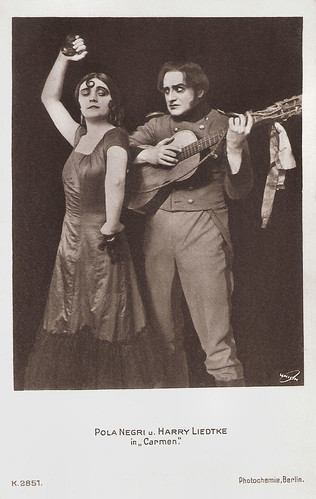
German postcard by Photochemie, Berlin, no. K. 2851. Photo: Union. Pola Negri as Carmen and Harry Liedtke as Don José in Carmen (Ernst Lubitsch, 1918).
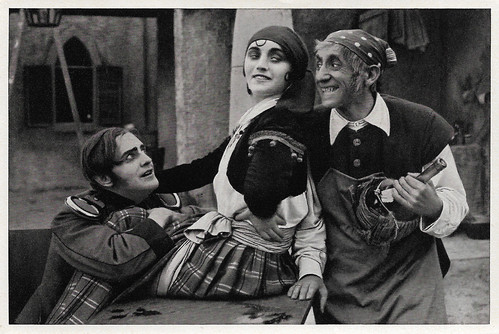
German collectors card by Ross Verlag in the series Vom Werden deutscher Filmkunst - Der Stumme Film, picture no, 59, group 43. Photo: Ufa. Publicity still for Carmen (Ernst Lubitsch, 1918) with Harry Liedtke and Pola Negri.
Sources: Fritzi Kramer (Movies Silently), Stefan Droessler (Le Gionate del Cinema Muto), Wikipedia and IMDb.

German postcard by Photochemie, Berlin, no. K. 2765. Photo: Atelier Eberth / Union. Pola Negri as Carmen in the German silent drama Carmen (Ernst Lubitsch, 1918).

German postcard by Photochemie, Berlin, no. K. 2849. Photo: Union. Pola Negri as Carmen in Carmen (Ernst Lubitsch, 1918).

German postcard by Photochemie, Berlin, no. K. 2850. Photo: Union. Pola Negri as Carmen and Harry Liedtke as Don José in the German silent drama Carmen (Ernst Lubitsch, 1918).
Sassy, playful, capricious, cruel, generous…
Ernst Lubitsch’s career as a filmmaker blossomed just as the First World War was drawing to a close. In 1918, he went from being mostly a comedic director to a supposedly more serious filmmaker of pseudo-historical tragedies, with bigger budgets and a new star - Pola Negri, a fellow actor from the Deutsches Theater.
Lubitsch based his drama Carmen (1918) on the novella Carmen by Prosper Mérimée. Like George Bizet's opera Carmen, the film only adapts the third part of Mérimée's novella.
Lubitsch transformed the character of Don José (Harry Liedtke) at the beginning of the story from bandit on the run to honest man in love with his childhood sweetheart.
The story is told by a man at a camp-fire who says that it took place many years before. Don José was a Dragoon Sergeant in Sevilla who fell madly in love with Carmen (Pola Negri), a beautiful gypsy. For her, he killed an officer and gave up his fiancée and his career in the army, and became a smuggler.
But Carmen's love did not last. She left him and went to Gibraltar where she fell in love with the famous bullfighter Escamillo. Back in Sevilla, Carmen rode triumphantly in Escamillo's carriage on his way to a bullfight. At the end of the bullfight, José confronted Carmen and when she told him that she no longer loved him, stabbed her to death.
Back at the camp-fire seen at the beginning, the man who told the story adds that some say that Carmen did not die ′for she was in league with the Devil himself.'
Carmen debuted in December 1918 at the U.T. Lichtspiele on Kurfürstendamm. It was a huge success in Germany with audiences and press.
After the unexpected American success of Madame Dubarry (released as Passion in December 1919), Carmen was re-edited for an American release in 1921, as Gypsy Blood. In the American version the framing story was hand-coloured and Lubitsch’s name was left off the credits. Adolph Zukor brought Pola Negri to Hollywood in the summer of 1922. He was not interested in Lubitsch, who had also hoped to get a contract with Paramount.
In her review at Movies Silently, Fritzi Kramer writes: "I am a fan of Geraldine Farrar’s lively take on the role in the 1915 Cecil B. DeMille version but Pola Negri is the best silent Carmen by far. Sassy, playful, capricious, cruel, generous… Negri projects all of Carmen’s contradictions on the screen and delivers an astonishing performance."

German postcard by Photochemie, Berlin, no. K. 2851. Photo: Union. Pola Negri as Carmen and Harry Liedtke as Don José in Carmen (Ernst Lubitsch, 1918).

German collectors card by Ross Verlag in the series Vom Werden deutscher Filmkunst - Der Stumme Film, picture no, 59, group 43. Photo: Ufa. Publicity still for Carmen (Ernst Lubitsch, 1918) with Harry Liedtke and Pola Negri.
Sources: Fritzi Kramer (Movies Silently), Stefan Droessler (Le Gionate del Cinema Muto), Wikipedia and IMDb.
1 comment:
I love this lady! The curl in the middle of her forehead is so cute. Thanks for posting. I had never heard of this actress before...what you wrote is delightful.
Post a Comment